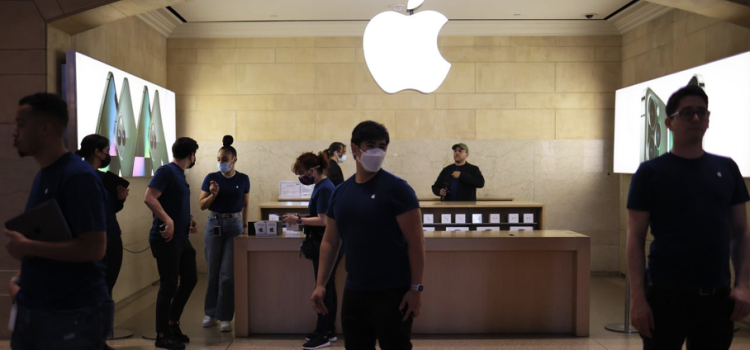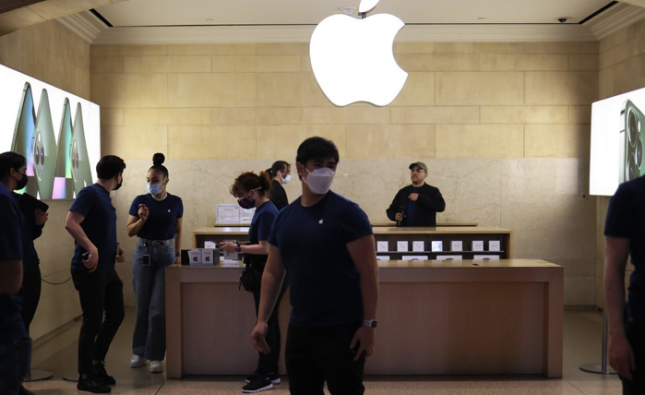
Introduction
Every holiday season, Apple Store teams work long hours to help customers find the perfect gift. Yet many employees say their pay doesn’t match the extra effort. Now, unionized staff at Apple’s Towson Town Center store are pushing for higher holiday pay and a chance to accept tips. Their demands have sparked debate about fair wages, workplace culture, and whether tipping belongs in Apple’s famously polished retail experience. In this article, we’ll explore why Apple Store employees are negotiating for better holiday pay and tipping options, what they’re asking for, Apple’s response, and what it all means for the future of retail work.
A Brief History of Apple Store Unionization
Until recently, Apple retail workers had little collective bargaining power. In May 2022, employees at the Towson, Maryland, Apple Store made headlines as the first U.S. location to unionize under the International Association of Machinists & Aerospace Workers (IAM). Their goals included better pay, safer working conditions, and a stronger voice in store policies.
Since then, union drives have popped up in other U.S. stores, though not all efforts succeeded. The Towson store remains the flagship for Apple’s growing labor movement. Its workers use their union to bring formal proposals to management—most recently, a package aimed at boosting holiday compensation and adding tips.
Why Holiday Pay Matters
Extra Hours, Extra Stress
The weeks around Black Friday and Christmas are the busiest of the year. Apple Store employees often work:
- 12-hour shifts to cover early openings and late-night launches
- Weekend and holiday hours when most others are off
- Small teams juggling huge crowds and high customer expectations
All of this can lead to fatigue and burnout. Yet, under Apple’s current policy, qualifying for holiday pay is limited. Employees say holiday pay should reflect the true cost—both physical and emotional—of working through the season.
The Union’s Proposal
In contract talks, the Towson store union has asked for:
- Higher Holiday Premiums: Pay at 1.5× or 2× the normal rate for all hours worked on federal holidays, including the day after Thanksgiving (Black Friday).
- Expanded Holiday List: Include more company-observed holidays—such as Martin Luther King Jr. Day and Juneteenth—in the premium-pay schedule.
- Guaranteed Time Off: A set number of paid holidays off based on seniority, so that employees get an actual break, not just extra pay.
By securing these changes, workers hope to make the holiday season less punishing and more sustainable year after year.
The Case for Tipping at Apple
Why Tips?
Tipping is rare in electronics retail, but the union argues it could:
- Reward Excellent Service: Let customers directly thank employees who go above and beyond.
- Boost Take-Home Pay: Provide extra income that isn’t subject to corporate performance bonuses or profit margins.
- Level the Playing Field: Ensure that gift buyers in a holiday rush can reward staff the same way they would with baristas or bellhops.
How It Would Work
Under the union’s proposal, Apple would:
- Enable a “Tip” Prompt at Checkout: When customers pay by card, the terminal would offer preset tip amounts (e.g., 3%, 5%, 10%) or a custom option.
- Pool and Distribute Tips: Tips collected daily would be pooled and divided evenly among hourly retail staff at the end of each pay period.
- Maintain Voluntary Nature: Customers would not be pressured; tipping would remain optional.
This system mirrors models in restaurants and ride-share apps, but applying it to tech retail is a bold shift for a brand known for its “no tip” culture.
Other Key Contract Demands
While holiday pay and tips grab headlines, the Towson store union is negotiating a comprehensive benefits package. Their full wishlist includes:
- 10% Across-the-Board Raises: To keep pace with rising living costs.
- More Vacation and Sick Leave: Vacation time that grows with each year of service and paid sick days without caps.
- Extended Bereavement Leave: Up to 45 days per year for family, close friends, and even pets.
- Overtime Pay Adjustments: Time-and-a-half pay for hours beyond 40 per week and double-time for weekend and holiday hours.
- Professional Development Stipends: Funds for certifications, first-aid training, and skills workshops.
- Severance Pay: Two weeks per year of service if layoffs occur, up to a generous cap.
By packaging these demands together, workers aim to address both everyday fairness and the extreme demands of the holiday rush.
Apple’s Response So Far
Apple has not publicly committed to specific changes yet. Company representatives have emphasized:
- Competitive Pay: Apple believes its base wages and bonus structures already rank among the industry’s best.
- Generous Benefits: The company highlights paid parental leave, medical coverage, employee stock purchase plans, and performance-based bonuses.
- Open Dialogue: Apple says it values feedback from all employees and is engaged in ongoing negotiations with the IAM.
However, some workers say Apple’s official statements do not match their lived experience during peak season. They point to long lines, understaffed floors, and high customer anxiety as evidence that more support is needed.
What This Means for Retail Work
A Broader Tipping Debate
If Apple allows tips, other retailers may follow. This could reshape how customers interact with high-end retail:
- Consumer Behavior: Shoppers might choose stores with tipping options to reward better service.
- Industry Standards: Electronics, furniture, and appliance stores could adopt similar models.
- Wage Structures: A shift toward lower base pay and reliance on tips could emerge—raising questions about wage stability.
The Power of Organized Labor
Apple’s negotiations show that a unionized store can influence policies at a trillion-dollar company. Success here may inspire other retail workers—from Target to Starbucks—to push for holiday premiums, tipping, and stronger benefits.
Customer Experience
For customers, tipping could add complexity at checkout. Clear communication will be key to ensure shoppers feel comfortable and understand where gratuities go.
Expert Perspectives
- Labor Economists note that tip models work best in industries where service quality varies widely. In a highly standardized environment like Apple’s retail stores, the impact on performance may be minimal.
- Retail Strategists believe holiday pay increases are more straightforward. Premium holiday rates are common in hospitality and logistics and pose little risk to customer experience.
- Consumer Advocates warn against “tip fatigue.” If every retailer asks for tips, shoppers may feel overwhelmed and reduce discretionary spending.
Balancing these views will be crucial as Apple and the IAM hammer out an agreement.
Looking Ahead
Contract talks will continue through the fall. Key dates include:
- Mid-November Negotiations: Final proposals and counteroffers ahead of Thanksgiving.
- Union Vote: Members must approve any tentative agreement.
- Implementation in Time for Holidays: Both sides aim to settle before the Black Friday rush.
A deal could set a precedent for other unionized and non-unionized Apple Stores. Observers across retail and tech will watch closely to see if Apple adapts its polished, tip-free model to changing worker expectations.
Conclusion (90 words)
As Apple Store employees push for higher holiday pay and a tipping option, they’re reshaping a retail model long defined by polished service and fixed salaries. Their demands—ranging from premium holiday wages to pooled customer tips—seek to reward extra effort during the busiest season of the year. Apple’s response will signal whether one of the world’s most valuable companies can adapt to rising calls for fair pay and worker-driven benefits. For employees, customers, and the broader labor movement, this negotiation is more than policy—it’s a test of how retail work evolves to meet modern needs.










